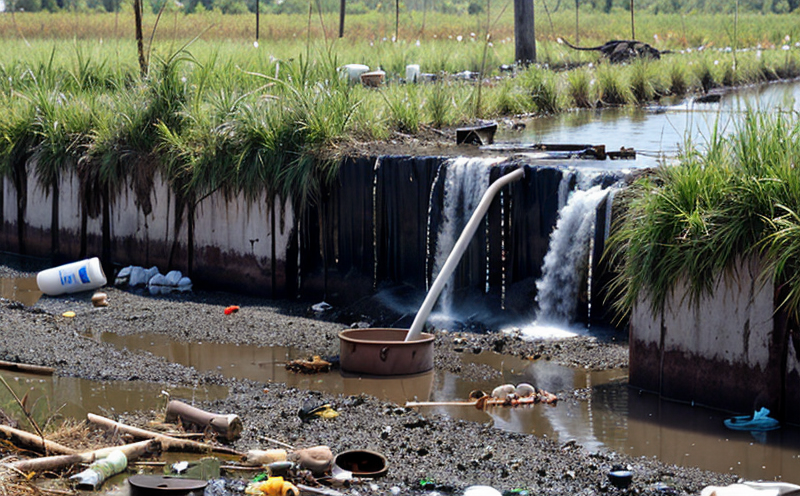DIN 38407 Organic Pollutant Testing in Groundwater
The DIN 38407 standard is a cornerstone of environmental compliance and quality assurance in Germany, focusing specifically on the detection and quantification of organic pollutants in groundwater. This service ensures that water sources are safe for consumption or use in industrial processes, aligning with international standards like ISO 14001 and ISO 9001.
Groundwater is a critical resource for drinking water supply and agricultural irrigation. The presence of organic pollutants can pose significant risks to human health and the environment. DIN 38407 provides robust methods to identify these contaminants, ensuring that groundwater meets stringent safety standards set by regulatory bodies.
The testing process involves several key steps, each critical for accurate and reliable results:
- Sample Collection: Proper sampling is essential. Groundwater samples are typically collected using specialized equipment designed to minimize contamination. This includes the use of sterile containers and adherence to strict handling protocols.
- Sample Preservation: Samples may be preserved with appropriate chemicals or refrigerated to prevent degradation before analysis.
- Preparation for Analysis: Samples are prepared according to DIN 38407 guidelines, which include detailed procedures for extracting organic compounds from the matrix.
- Analytical Methods: The analysis is conducted using advanced instrumentation such as gas chromatography-mass spectrometry (GC-MS) and liquid chromatography-tandem mass spectrometry (LC-MS/MS). These methods provide high sensitivity and specificity, essential for detecting trace levels of pollutants.
- Data Interpretation: Results are compared against established limits set by the standard. Any detected contaminants are evaluated based on their potential health impacts and legal thresholds.
The importance of this test cannot be overstated. It plays a pivotal role in environmental protection, public health, and industrial operations. By adhering to DIN 38407, organizations can demonstrate compliance with local regulations and international best practices, thereby safeguarding precious groundwater resources.
For quality managers, compliance officers, and R&D engineers, this service offers invaluable insights into the presence of organic pollutants in groundwater. It helps in making informed decisions regarding water treatment processes, pollution control strategies, and risk management.
Applied Standards
DIN 38407 is part of a series of standards that focus on environmental analysis methods. This particular standard is widely recognized for its rigorous approach to detecting organic pollutants in groundwater. It aligns with other international standards such as ISO 16819 and ASTM D7475, ensuring consistency and reliability across different regions.
The application of DIN 38407 extends beyond mere compliance; it supports a broader commitment to sustainable practices. By adhering to these standards, organizations contribute to reducing environmental impact and promoting healthier ecosystems.
- Comprehensive Scope: The standard covers a wide range of organic compounds, including pesticides, solvents, and industrial chemicals.
- Sensitivity and Specificity: DIN 38407 ensures that even trace levels of pollutants are detected with high accuracy.
- Legal Compliance: Adherence to this standard helps organizations meet regulatory requirements imposed by governmental bodies.
- Reputation Enhancement: Demonstrating compliance builds trust and credibility among stakeholders, including customers, employees, and the community.
The integration of DIN 38407 into your organization's quality management system ensures that you are at the forefront of environmental stewardship. By leveraging this standard, you can confidently address challenges related to groundwater pollution and contribute positively to global sustainability efforts.
Why Choose This Test
The DIN 38407 Organic Pollutant Testing in Groundwater is a critical service that offers several advantages over other testing methods:
- Accurate Detection: With high sensitivity and specificity, this test can detect even trace levels of organic pollutants, ensuring comprehensive data.
- Comprehensive Coverage: The standard covers a wide range of contaminants relevant to groundwater quality.
- Regulatory Compliance: Adhering to DIN 38407 ensures compliance with international standards and local regulations.
- Risk Management: Regular testing helps in identifying potential risks early, allowing for timely interventions and mitigation strategies.
- Reputation Enhancement: Demonstrating commitment to environmental stewardship builds trust and credibility among stakeholders.
- Expertise: Our team of experts ensures that the test is conducted with precision and accuracy, providing reliable results.
The importance of this service cannot be overstated. By choosing DIN 38407 Organic Pollutant Testing in Groundwater, you are investing in the safety and quality of your water sources. This commitment to environmental protection sets a benchmark for excellence that resonates with all stakeholders.
Competitive Advantage and Market Impact
DIN 38407 Organic Pollutant Testing in Groundwater provides significant competitive advantages and market impacts:
- Ethical Leadership: By adhering to this standard, organizations demonstrate leadership in environmental sustainability.
- Enhanced Reputation: Compliance with international standards enhances your reputation as a responsible corporate citizen.
- Innovation and Differentiation: Offering this service differentiates you from competitors who may not provide such comprehensive testing options.
- Potential for Growth: Demonstrating commitment to environmental quality opens doors to new markets and clients seeking sustainable practices.
- Regulatory Compliance: Ensuring compliance with local regulations can prevent costly penalties and legal issues.
- Customer Satisfaction: Providing reliable testing results builds trust and loyalty among customers, fostering long-term partnerships.
The impact of this service extends beyond individual organizations. By ensuring the quality and safety of groundwater resources, you contribute to broader environmental benefits that positively affect communities and ecosystems. This commitment to excellence in testing sets a benchmark for future generations.





